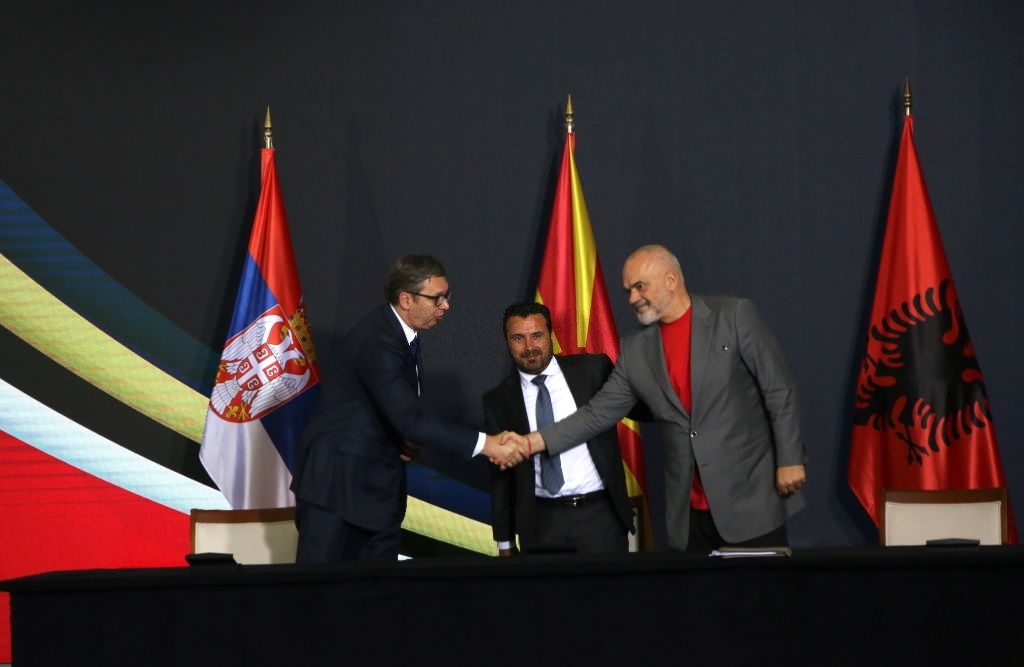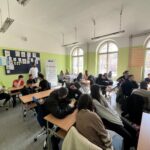Changing the name, signing three documents (on easing imports, exports and movements of goods; on access to labor markets and disaster preparedness and mutual assistance), positive messages sent from Skopje, ending with an ambitious goal of eliminating all border controls between Serbia, Northern Macedonia and Albania until January 1, 2023 – should speak of “Open Balkan” as the only one showing the potential to become the backbone of a more intensive regional economic cooperation. Not between all members of the “Six”, though – but only those who want to. With the future of the Berlin process (still) uncertain, after its return to Germany; the common regional market, despite the comprehensiveness of RCC’s approach, still suffering from lack of implementation; and some other ideas (Kurti’s SEFTA; the “Six” as part of the European Union single market) for the time being only – ideas; whatever they think of three leaders and their intentions, in Skopje they re-confirmed that they are ready to invest political capital in continuing this story that started in Novi Sad two years ago. As they move forward, problems remain.
First is also the most important – where to go from here, but also with whom. Resistance to “Open Balkan” is most pronounced in Kosovo. Senior officials interpret it as “dangerous for stability and peace” (Donika Gervalla Schwartz); spearheaded by Serbia “which cannot be trusted due to the events from the 90s” (Mimosa Kusari Lila); previously, Prime Minister Kurti saw it as “Fourth Yugoslavia”, while Rama granting his support was compared to betrayal of Kosovo’s interests. Montenegro and Bosnia and Herzegovina have hesitated – partly for political reasons (distrust of Belgrade’s intentions), and partly economic (uncertainty regarding economic benefits). With CEFTA present for over a decade now, one way to approach Podgorica and Sarajevo is to explain what “more” does “Open Balkan” bring.
Authorities in Pristina, of course, have every right not to be part of this story. Among arguments against, one that may be most convincing is not wanting to participate in something where you expect not to be treated as an equal partner. The paradox is, however, that under US auspices last year, Pristina was invited to “Mini Schengen” as Kosovo – without questions over status. Perhaps aware of the importance of Washington Agreement, which facilitated the recognition by Israel (strategically important “exit” in the conditions of statehood being contested) the ruling majority did not vote against the resolution Kosovo’s opposition submitted in the Assembly, on its implementation being continued. Meanwhile, many have noted how US Embassy in Pristina has called on Kosovo to approach regional economic initiatives “with an open mind”.
From the abolition of barriers, the strongest economy would benefit the most; and in the context of the Western Balkans, it is Serbia, generating half of the region’s GDP. One growing economy needs workers, preferably qualified; and in theory, they would replace the ones who have left the country, or switched to other jobs where one can earn more than minimal wage. As there are now factories in which the base salary is somewhat higher, competition for labor is now increasing between foreign investors. For them, reducing (“optimizing”) business costs remains the chief motive for coming to the country in the first place.
There is fear, in the words of one trade union representative, that “Open Balkan” will lead to “dumping” of the price of work, bringing domestic workers to a even more difficult position. (Typical response from business owners is they already lack workers and the trend of “importing” them from abroad is irreversible.) We see examples of engineers who came from North Macedonia to Loznica; qualified workers who found employment in Kruševac, but it seems to be few and far between. One third of construction workers building “Morava Corridor” from Pojate to Preljina on behalf of Bechtel Enka are Turkish citizens.
Also, can we imagine a two-way process, where skilled workers leave Serbia to other two countries? To go a step further, yet ask a natural question, what could motivate someone from Belgrade, Novi Sad or Nis to look for work in Skopje or Tirana? So, there is a human dimension, which this initiative can hardly provide an answer to. Perhaps one logical next step would be to create a regional job search engine.
As for producers looking to market their products, a thousand and one calculation exists and it is impossible to follow up on everything. To use a phrase, everyone believes in their chance under the sun: someone may be hoping for a more efficient value chain, to reach new vendors and subcontractors. There are also tenders, public works, infrastructure investments: hard to imagine all of them being set up. Lastly, tourism. Every year, one million people from Serbia travel to spend their hard earned ten days on the beach. Season 2 of “corona tourism” running, and Albania’s seaside has established itself as a legitimate destination, doing more for people to people contacts than… anything.
The fourth problem concerns the unresolved relation with other initiatives and frameworks directed at regional economic cooperation (and potentially, integration), first and foremost the common regional market, being tied to both the Berlin process and the EU-WB dimension and leaders’ summits. The ability to travel freely between the Six by using your ID only originated as an idea within the Berlin process – but did not pass, together with several other progressive ideas and proposals.
Of course, there is a strong political dimension, or motivation behind the “Open Balkan”. Ones who have initiated it can say, “we are doing (something concrete) for the region”; “we are taking ownership”. In Skopje, all three departed from the argument that they can wait no longer for the European integration to continue; what makes the initiative important is that its initiators are countries from the region, rather than the international community; that it will bring practical benefits and is not directed against anyone. In his op-ed (programmatic article), Vucic even used the oft-cited example of French-German reconciliation through economy.
Lack of trust is, however, significant. A headline taken from the Radio Free Europe article summarizes it best: “Vucic’s ‘Open Balkans’: Economic profit or Serbian hegemony”. Official Belgrade is not helping by failing, perhaps deliberately, to distance itself from the provocative idea of “Serbian world” – one that is already backfiring in Montenegro. Provocative, since there is no explanation attached to it. And even if there was one, would it resemble the “russkiy mir” (the overall interaction of culture, traditions and society, national “peculiarity”), or, in the words of Darko Tanaskovic, writing for “Politika”, “the totality of language, cultural, traditional and mental, not primarily territorial space in which Serbs live, (which) should not worry anyone”? Reconciling the two hardly seems possible. However, if the initiators of the “Open Balkan” succeed in their intentions, and achieve the goals they have proclaimed, a new perspective will open, regardless of suspicions.
The author is Marko Savkovic, Executive Director of the Foundation BFPE for a Responsible Society, Belgrade













